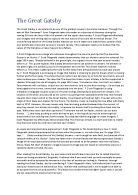There are many similarities and even more differences in the character Jay Gatsby, from The Great Gatsby by F. Scott Fitzgerald, and Cottard, from The Plague by Albert Camus.
Kishan Patel
6th Hour
IB Language Y1
Similarities and differences between Jay Gatsby and Cottard
There are many similarities and even more differences in the character Jay Gatsby, from The Great Gatsby by F. Scott Fitzgerald, and Cottard, from The Plague by Albert Camus. Fitzgerald, when he wrote The Great Gatsby, he based it off of much of his own life, but also on how the American Dream had been skewed by the want for money. Albert Camus, in writing The Plague, created Cottard to add a slight twist of existentialism into the novel. Also, when first reading about Cottard, the reader is given some details of his character. “But Cottard was a silent, secretive man, with something about him that made Grand think of a wild boar. His bedroom, meals at a cheap restaurant, some rather mysterious comings and goings—these were the sum of Cottard’s days,” (Camus 53). The similarities between the characters will be discussed first, then the differences, and finally, a cultural viewpoint of American literature versus French literature.
When looking at the similarities between the characters Gatsby and Cottard, there are many, yet each one of those similarities is in a completely different moral viewpoint. The differences will be discussed after the similarities. First and foremost, the most prevalent similarity between the two characters is that both of them are criminals. Gatsby, in order to become wealthy, turns to illegally selling alcohol during the Prohibition. This is kept under a very thick veil in the beginning of the book, and the front side of Gatsby that is given is that he is a wealthy drug store chain owner, and a very generous person. He often throws extravagant parties and invites everyone (Fitzgerald). Now, when we look at Cottard, although his character in The Plague is a minor one, the amount of detail about him is extravagant. Cottard, like Gatsby, is a criminal, though nobody seems to know what he did before he moved to Oran. Perhaps what brings Cottard out into the light is the fact that he attempted suicide, which gets him sympathy, but also people just avoid him altogether, making him alone. He actually doesn’t mind this. “… not to say his mistrust of everyone he met,” (Camus 53), is referring to Cottard, and how he didn’t trust anyone he met. So when people just didn’t talk to him, he actually didn’t mind this at all, although he was always looking for new people to meet, and was very selective as to whom it was he befriended. When the plague hits Oran, Cottard makes a living by smuggling people out of the quarantined town of Oran, similar to Gatsby, who smuggled alcohol to people during the ban of alcohol. While Gatsby already had a huge mysterious, but almost prestigious reputation, Cottard was constantly trying to get ‘friends’ so that they could testify for him in his favor, should a need arise.







